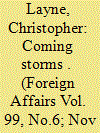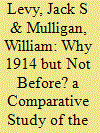| Srl | Item |
| 1 |
ID:
175219


|
|
|
|
|
| Summary/Abstract |
Since the closing days of the Cold
War,U.S. policymakers, pundits,
international relations scholars, and
policy analysts have argued that greatpower war is a relic of a bygone age.
|
|
|
|
|
|
|
|
|
|
|
|
|
|
|
|
| 2 |
ID:
180456


|
|
|
|
|
| Summary/Abstract |
Why did the July 1914 crisis—but not crises in 1905, 1908–9, 1911, and 1912–13—escalate to great-power war despite occurring under similar international and domestic conditions? Explanations based on underlying and slowly changing structural, social, or cultural variables cannot answer this question. Examining three Balkan crises of 1912–13 and the July Crisis, we refine realist explanations based on power, alliances, and reputational interests by incorporating the impact of changing power distributions and alliances in the Balkans on the great-power security system. A more complete answer to the why-1914-but-not-before question, however, requires the incorporation of Franz Ferdinand’s assassination, which went beyond a pretext for war. It eliminated the most powerful and effective proponent for peace in Vienna and fundamentally changed the nature of the decision-making process in Austria-Hungary. Counterfactually, we argue that a hypothetical crisis with Franz Ferdinand present would probably have ended differently.
|
|
|
|
|
|
|
|
|
|
|
|
|
|
|
|